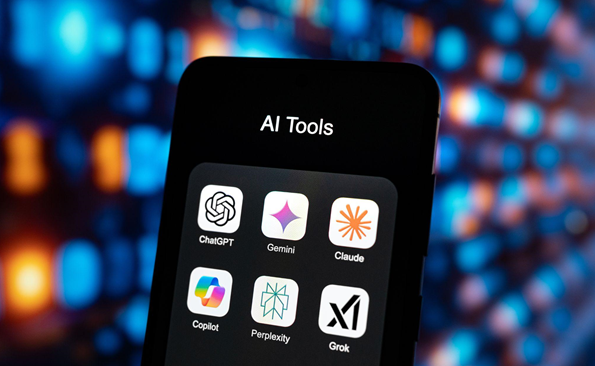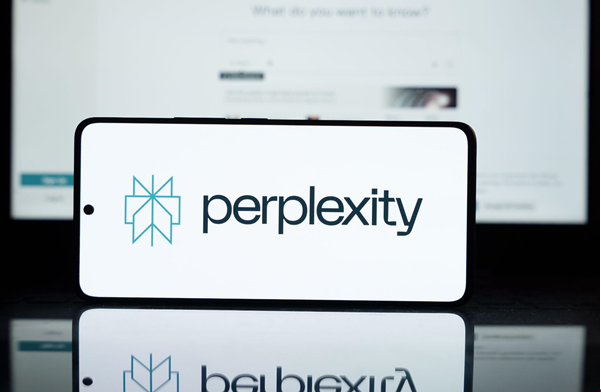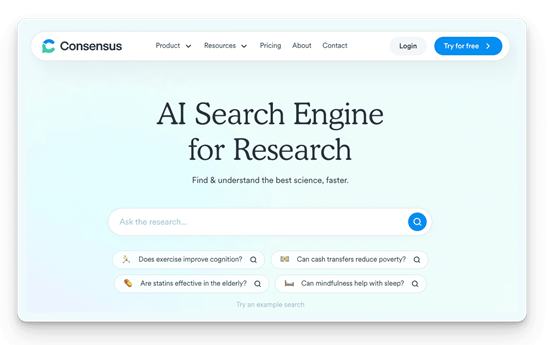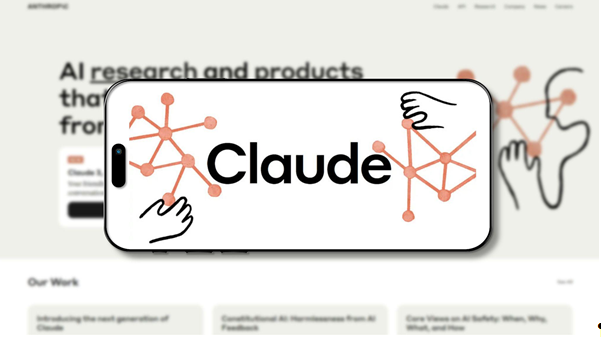3 Best AI for researchers in 2025

Best AI for research is the next big thing in the tech world. Regardless of our location, it’s undeniable that AI is the latest advancement in technology. AI, like science fiction a few years back, has become a reality in the 21st century. Surprisingly, AI has already been integrated into our lives in ways we could not imagine, from voice assistants to typing adjustments, even in travel tech solutions like connecting eSIM Taiwan solutions. AI is everywhere, even in the field of research, where there are some of the best AI for research. The Bloomberg website is full of new technologies related to AI, showing the rising innovation and trends in tech industries related to AI. Then comes the question.
How can AI assist researchers?
Not all tools out there can be effective for research purposes; each has pros and cons, but there is good news for researchers: In the market, there are AI tools available exclusively for research purposes. These tools are developed in a way to help you get access to various research materials within a short period, making extensive research easier. Researchers effectively use these AI tools for analytical, scientific, academic, and industrial research. New AI models such as AlphaFold 3 predict protein folding, have revolutionized the use of AI in the medical and healthcare industries. Research giants like CERN are also developing their own AI research tools, collaborating with ATLAS and CMS to search for exotic-looking collisions that could indicate new physics. In this article, let us have a look at some of the best AI tools for researchers available in the market.
Are you a researcher? AI tools are here to help you.
As we are familiar with AI tools that use LLM for creating content and for brainstorming ideas, various other tools that use similar features can be completely used for research and academic purposes. Examples of these tools include Perplexity, Consensus, and Claude by Anthropic. Each of these AI-assisted tools serves different purposes, while you use them for research purposes. The development of these AI-assisted research tools aims to simplify the research process in comparison to traditional methods. In today’s rapidly evolving world, researchers can gain a significant edge in their work by utilizing AI assistance. These AI tools not only provide materials but can also serve as assistants to help researchers throughout their research process. But on the downside, researchers must always keep in mind that AI-assisted information is only data, and it has to be verified or analyzed with a human touch to get the best results out of it.
Perplexity AI: Faster and more effective research

Perplexity AI, or simply Perplexity, is an AI-assisted search engine that uses a large language model to process queries and synthesize output based on web searches. The key feature that distinguishes Perplexity from other AI tools is that Perplexity summarizes the search results and provides inline citations. Its well-cited result makes it one of the best AI for research. Perplexity is one of the best AI research tools because it stands out in areas like:
- Real-time web search: Generates up-to-date data from across the web and also provides verified sources for fact-checking, making it the best AI for research purposes.
- Citation Generation: One of the key features that makes this AI tool so attractive is its ability to generate citations.
- Multi-source Synthesis: Does an extensive analysis with various documents to give the best result possible while synthesizing output.
Pricing of Perplexity AI
- Free: The Free version of Perplexity AI enables users to conduct unlimited searches for basic answers to simple questions, utilizing Perplexity’s standard AI model.
- Pro: Pro unlocks a stack of premium features that are best suited for AI-assisted research. The price of Perplexity Pro is $20 per month or $200 annually. If you are a researcher, an annual subscription could be a cost benefit. Perplexity Pro provides access to powerful AI models like GPT-4 Omni and Claude 3, which allow file analysis of PDFs, CSVs, and images.
Key features of Perplexity AI
| Features | Specifications |
| Platforms | Web, IOS, Android |
| AI models | GPT3.5, GPT 4 |
| Search source | Academic databases and news sites |
| Real-time update | Yes |
| File support | Yes (only in pro version) |
| Citation support | Automatic with links |
| Languages | 10+ languages |
| Browser support | Chrome, Firefox, Safari |
Pros and Cons
- Pros: Accuracy, Citation, real-time update, research-focused design, and code generation
- Cons: Potential for hallucinations, limited conversational interaction, dependency on Third-Party LLMs, and sometimes short replies.
Consensus AI: The Future of AI-assisted

The landscape of academic and professional research is completely elevated to the next level with AI tools for research as a research assistant. AI research assistants are primarily developed leveraging machine learning, data analysis techniques and natural language processing to streamline the research process, making the research more effective and efficient. Academic research is known for its time-consuming process. To make research easier, the tech industries have developed various AI tools for research, one such is the Consensus AI. Consensus, unlike other online AI-assisted tools, aids researchers in their research by offering evidence-based solutions. Consensus, like its counterpart AI tools like ChatGPT, uses natural language processing to draw research results. It offers unique features for analyzing academic journals and gives summaries highlighting key findings, methods, and conclusions from various resources, making the research process simpler. One key feature of Consensus AI is that it provides a visual representation of the agreement or disagreement among various researchers on a specific subject, helping to understand the overall standing of a particular subject, making it one of the best AI for research. As academic researchers, the various criteria such as study design, sample size, and methodology are very important for research. Consensus AI offers a unique assistance by doing advanced filtering based on the criteria one wants to research. Citations are also well synthesised, and the feature of enhanced understanding makes complex research more accessible and understandable. Thus, making AI-assisted tools more efficient than having a real research assistant.
Pricing of Consensus AI
- Free: It provides a free service for basic users
- Premium: Premium is approximately $9 a month or $108 billed annually.
Key features of Consensus AI
| Features | Specifications |
| Platforms | Web |
| AI models | Retrieval-Augmented Generation Techniques |
| Search source | Academic databases and news sites |
| Real-time update | Yes |
| File support | Yes (only in pro version) |
| Citation support | Automatic with links |
| Languages | Supports more than 50 languages |
| Browser support | Chrome, Firefox, Safari |
Overall, Consensus AI can accelerate literature review at a greater level by breaking down complex research questions into plain language. Because Consensus AI reflects a consensus across multiple studies, it saves time for researchers proving that they are the best AI-assisted tool. Its ability to pull peer reviews from PubMed, Semantic Scholar, and OpenAlex enhances the credibility of the research work. Furthermore, for evidence-based research, the AI-assisted tool highlights conflicts of interest, funding sources, and limitations when available, making it one of the best AI for research.
Pros and Cons
- Pros: Enhanced communication, increased ownership and buy-in, improved collaboration, reduced conflict and division.
- Cons: time-consuming(compared to other AI tools), potential for “Groupthink,” and potential for exploitation.
Claude AI: Scientific Discovery

Claude, developed by Anthropic AI, is trained to have natural text-based conversations, and it excels in code-writing, decision-making, and much more. One of the smart features of Claude is that it can read up to 75,000 words at a time, which means it can read a short book and can also offer analysis on it when questioned. This makes it one of the most intelligent AI tools for research. Claude AI can be an excellent tool for researchers who have to code for their research, and it also offers very powerful coding abilities. They are capable of generating complex code, debugging errors in code, and can also explain complex code in simple terms for user understanding. The platform also offers options for users with dyslexia. Users can choose a font that can help them read and respond better. Some key features of Claude AI are text generation ability, sentiment analysis, code snippet generation, vision analysis, problem solving, and code generation.
Pricing of Claude AI
Claude AI’s pricing is diverse, unlike their competitors.
- Free: There is a free version available for researchers who use these AI tools only for limited tasks.
- Pro: Pro offers $18 per month, team $25 per month, and for enterprise, a very different package.
Key features of Consensus AI
| Features | Specifications |
| Platforms | Claude app, Slack, Notion, Zoom, etc |
| AI models | Constitutional Al |
| Search source | Academic databases and web search features |
| Real-time update | Yes |
| File support | Yes (max 30 MB per file) |
| Citation support | Limited |
| Languages | Multi-language support |
| Browser support | Chrome, Firefox, Safari, Edge |
Pros and Cons
- Pros: Powerful code generation features and highly conversational
- Cons: Occasionally crashes and can be overly verbose.
Wrapping Up: Smarter Research with Smarter Tools
Researchers in 2025 can do their research a lot faster and effectively, using these AI-assisted tools, showing how far the technology has developed. The use of one AI-assisted tool alone cannot serve the purpose of research. With the advancement of technology and the fact that AI tools are still in the phase of development, it is best to always check the results generated by these tools to avoid any biases in the research work. In conclusion, Perplexity can be applicable when you need to search for a lot of research-related documents, as it provides lots of materials with citations and summaries for quicker understanding. Conversely, for collaborating with other researchers and swiftly reducing biases influenced by opinions, Consensus is the most effective AI tool for research. Additionally, for researchers needing extensive coding and analytical capabilities, it is recommended to use Claude AI by Anthropic. Instead of using only one tool, researchers can try to combine the combination of these tools to get better research work. AI-assisted tools have finally made the research industry more attractive to young minds.




